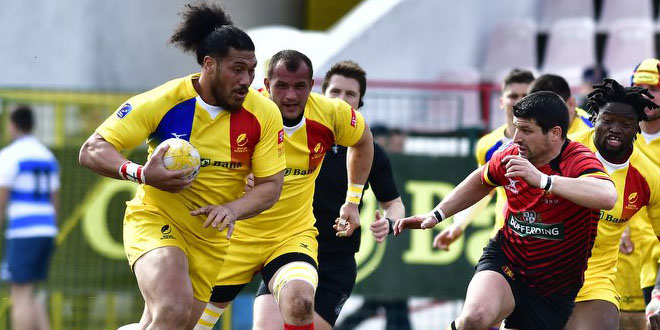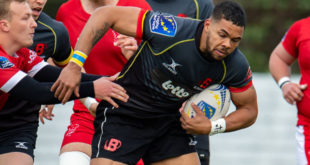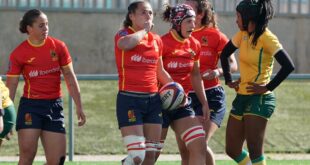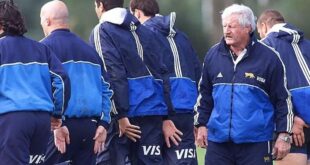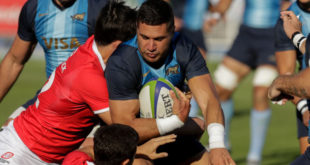Hot on the heels of player eligibility rows that have seen Tahiti disqualified from World Cup qualification and Belgium under investigation is now a third case involving a Romanian international. The Oaks have incorporated several overseas players on residency to their team in recent years but the legitimacy of one player’s eligibility is now being challenged from outside sources including an online Russian publication.
Sione Faka’osilea is the player in question. The Baia Mare center arrived in Romania from his native Tonga in February 2014 and upon completing his three-year residency requirements debuted for his adopted country against Russia in March 2017. Since then he has played in 13 tests, starting six of the eight World Cup qualifying matches between the 2017 and 2018 Rugby Europe Championships.
At issue is his previous representative appearances for Tonga. He was a rugby league international for his home country prior to moving to Romania and also played for Tonga ‘A’ during the 2013 Pacific Rugby Cup, playing five games against Super Rugby development sides.
Neither of those two cases, however, are considered ‘binding’ as concerns international eligibility defined in World Rugby Regulation 8. International ‘A’ sides do fall under the regulation but only if the opposition is the “senior fifteen-a-side National Representative Team or the next senior fifteen-a-side National Representative Team of another Union.”
What is binding are international sevens matches, such as those on the HSBC Sevens Series. As it turns out Faka’osilea has also represented Tonga at sevens, specifically at the Gold Coast stop on the 2013-14 World Sevens circuit. He was a replacement in five matches including the opener against Kenya.
To resolve any confusion elsewhere whether this is in fact the same person, Faka’osilea provides the following description on his Sporple profile:
“Tongan Born rugby player, international 7’s player for Tonga (Ikale Tahi)2012,2013. Rugby League International for Tonga 2011,2012,2013. Currently Playing for Baia Mare Rugby Club at the Super League 2014 and 2015. I am honoured to have this opportunity to be able to have the dream job i have always wanted which is to play professional rugby and travel to different parts of the world and now applying my trade in Romania.”
By appearing for Tonga at the Gold Coast tournament Faka’osilea was then ‘captured’, meaning he could only represent Tonga internationally going forward. This is clearly defined in Regulation 8.2. Thus regardless of his fulfilling the three-year residency requirement for Romania, Faka’osilea was not eligible to represent Romania in any binding international competition.
There is one exception to this that was introduced in 2014 generally referred to as the ‘Olympic Loophole’. As the Olympics do not follow World Rugby eligibility criteria and require athletes to be passport holders of the nation they represent, World Rugby opted to allow players a chance to change their eligibility under certain conditions as defined in Regulation 8.7 – a three-year stand-down period and the event must be an Olympic Qualifier.
As the new ‘loophole’ was initiated less than three years before the 2016 Olympic Games, World Rugby then opted to allow for a one-time only 18-month stand-down period. Of particular importance to this method of transferring eligibility in this method is this line in Regulation 8.7.2: “The Player may not represent the second Union in any other form of the Game until after they
have participated in such Olympic Event.”
The 2013 Gold Coast Sevens tournament ended on October 13, meaning Faka’osilea would have been eligible to apply to represent Romania in an Olympic qualifying tournament as of April 13, 2015. The European qualifiers for the Olympics – the tournaments he would have been required to appear in – began on June 6, 2015, the first leg of the European Grand Prix in Moscow, and continued until July 19, 2015 at Lisbon. There were six tournaments in that time, Faka’osilea did not appear in any of them.
An important distinction with Olympic eligibility is that the player “must be a national of the country of the National Olympic Committee which it is representing in such Olympic Events.” In other words, the player must be a passport holder of the nation he wishes to represent. It’s clear that Faka’osilea did not qualify under that guideline for the Olympic qualifiers, and whether or not he does now is irrelevant given he would have had to participate in those events to change his eligibility.
Further examination of his pathway to the Romanian team suggests that the Oaks had never taken into account his appearance for Tonga at the Gold Coast. His first appearance in a Romanian selection of any kind was for the non-binding Romania ‘A’ matches against a ‘President’s XV’ and Welsh touring side Crawshays in May 2016. He was then included in initial Romanian training squad for the 2017 Rugby Europe Championship but was withheld from test duty until March in accordance with his February 2014 arrival date.
There is another notable name on that training squad roster – Eseria Vueti. His case is similar to that of Faka’osilea in that he had represented Fiji Warriors, Fiji’s designated ‘next senior’ side, against Tonga ‘A’ in the 2012 Pacific Rugby Cup. In this case the conflict was identified and Vueti was removed from the squad. Curiously, however, there was no mention of Faka’osilea’s prior history with Tonga Sevens and he remained part of the group.
In a statement released at the time Romanian team manager Horatiu Bargaunas said, “Following the talks with Eseria Vueti, he expressed his desire to play for Romania, not knowing that the second selected of Fiji, for which he played in a match, was considered the official team. We did all the steps to see if we could use it, if it is eligible for Romania, and the World Rugby response was a negative one, the game in which it played was considered an official match.”
Given this statement there seems to be three possible explanations for the continued selection of Faka’osilea in the Romanian team:
1) Faka’osilea never informed the Romanian officials that he had played for Tonga Sevens;
2) The Romanian officials did not realise his Tonga Sevens appearance was binding;
3) World Rugby was approached but erroneously cleared Faka’osilea to play for Romania.
The facts as they stand strongly suggest that Sione Faka’osilea was not eligible to represent Romania on debut against Russia and remains ineligible to represent Romania given that he has not appeared in an Olympic Sevens qualifying event. Unless explanation 3) as written above is indeed the case, this would appear to be a very unfortunate and hugely problematic oversight by the Romanian officials.
Just days ago World Rugby disqualified Tahiti from World Cup qualification after fielding two ineligible players against the Cook Islands. The most damning section of the judicial decision reads as follows:
“23. In relation to the Union, Regulation 2.1.2 provides each Union is responsible for ensuring compliance with all Regulations Relating to the Game. Accordingly it is the responsibility of each Union to ensure all players it selects are properly eligible within the provisions of Regulation 8; which as mentioned is a strict liability offence. Thus, as the Regulation clearly states, it is not necessary for fault or intent be shown on the part of the Union.”
The implications of this are enormous. Faka’osilea played a significant role in six World Cup qualifying matches. If Romania are found to have breached Regulation 8, based on the Tahiti precedent they will be out of the World Cup and Spain will advance as Europe 1. Russia would then play Portugal in a play-off to decide who advances to the Europe/Oceania play-off.
World Rugby’s integrity has never been so threatened. Having already tossed out Tahiti, they must now arbitrate the referee appointment for the Belgium vs Spain match, the subsequent post-game behavior by the Spanish players, Belgium’s use of an ineligible player against Germany, and a potentially disastrous error by Romania. As ever the rugby world awaits each decision with bated breath.
 Americas Rugby News Rugby news from across the Americas!
Americas Rugby News Rugby news from across the Americas!
